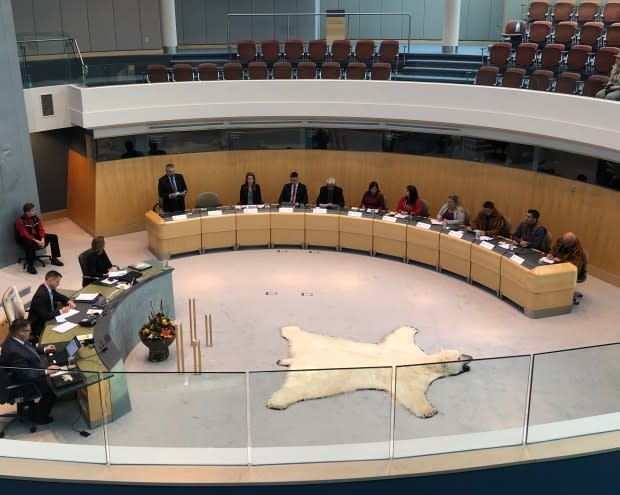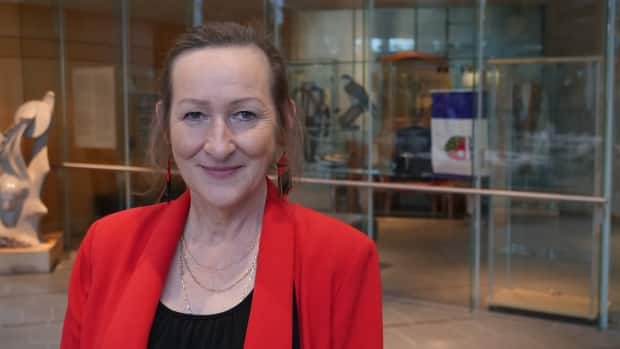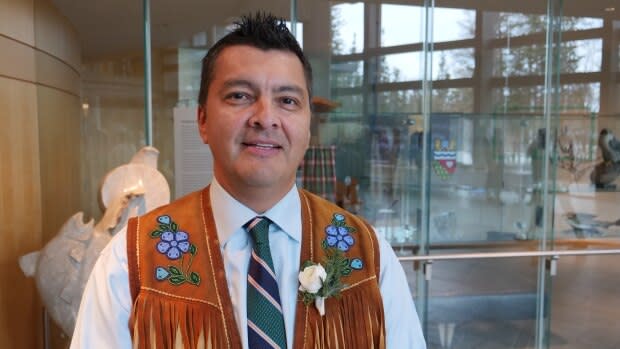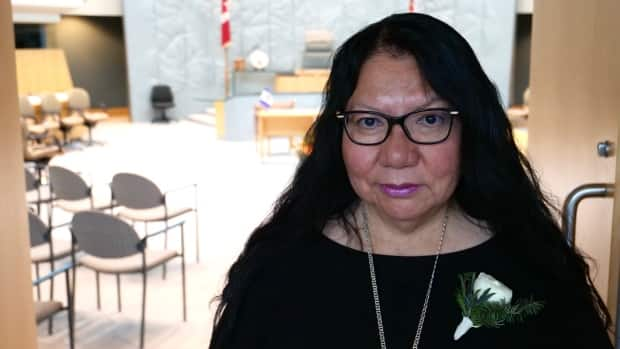Premier hopefuls talk reforms in first pitch to N.W.T. MLAs
MLAs hoping to become the next premier of the N.W.T. pontificated on policy and pleaded for change in public speeches at the Legislative Assembly Friday.
It's the first occasion the public has had to hear each candidate's case for taking the territory's top job.
Range Lake MLA Caroline Cochrane, Monfwi MLA Jackson Lafferty, Thebacha MLA Frieda Martselos and Hay River North MLA R.J. Simpson are all bidding for the role.
MLAs also had a chance to put questions to the candidates, and will again on Oct. 24, when the assembly reconvenes to vote for speaker, premier and cabinet by secret ballot.
In the end, no one will know who voted for the premier, or even how many votes they received.

Cochrane: 'Learn from our past to determine our future'
Cochrane faces an uphill struggle to win the premiership — the premier has come from a Yellowknife riding in the capital for the past 8 years, and angst over a perceived flow of services to Yellowknife was a major theme of the campaign.
"I am open and honest, and above all, I consider the needs of all people and all communities," she said.
Cochrane leaned on her experience in making her pitch to the MLAs. She was one of just seven incumbents returning to the Legislative Assembly after the Oct. 1 election, and is the only cabinet minister to win re-election.
Cochrane committed to some specific reforms in her speech, including issuing public "mandate letters" to her ministers and amalgamating the departments of lands and municipal and community services.
She also said she'd rename the Department of Industry, Tourism and Investment the "department of economic diversification and development," and would require "equity-based and gender-based analysis in any new program or service delivery."
On policy, Cochrane proposed a similar tack to her approach as minister of housing and education, organizing summits and rewriting "action plans" to establish the direction of government.
She said she'd review the territorial climate change priorities as outlined in two documents, a five-year action plan and a longer-term "framework." Both were released just last year.
She proposed a summit on the territory's economic future, inviting Indigenous government, industry leaders, and environmental groups.
"Prosperity for all must be an economic principle," she said. "Our economic strategy must consider the needs of our larger and our smallest communities."
As an MLA, Cochrane is perhaps best known for her enthusiastic reception of the Aurora College Foundational Review, produced during her time as education minister.
The report advocated the centralization of a new polytechnic university in Yellowknife, to the ire of residents of Fort Smith, where the college is currently based.
Cochrane did not discuss the college in detail in her speech, but she did commit to "three strong campuses in three strong communities."
In response to a question from Yellowknife South MLA Caroline Wawzonek, Cochrane said she's still committed to building a new campus in Yellowknife.
"Yellowknife campus is bursting at the seams," she said.

Lafferty: 'A leader who leads to serve'
Lafferty, the most experienced of the candidates, began his speech in Tlicho. He pledged his "hard-earned political skill" to fulfilling the priorities identified by MLAs.
"We need a leader ... who is open-minded, and a good listener," he said, "who has respect for different perspectives."
Lafferty referred to listening, dialogue, and "working together" repeatedly throughout the morning, saying he will incorporate the "diverse perspectives" of MLAs.
Like the other candidates, Lafferty committed to travel to communities more often, and to direct senior staff in government departments to travel as well.
However, he voiced a more positive outlook on the territorial bureaucracy overall.
"Our public service is a resource to be cherished and honoured," he said.
He pledged to ensure the representation of smaller communities in cabinet, though they are chosen not by the premier, but by the assembly as a whole.
In response to a question about his vision for Yellowknife, Lafferty did not buckle on his commitment to prioritize investment in the communities.
He said he'd prioritize spending where the need is greatest, and evaluate projects in Yellowknife for their benefits on the rest of the territory.
On climate change, Lafferty said he'd incorporate elders' perspectives, giving them "the same weight as science."
He also pledged support for "a polytechnic university on par with institutions in the South."
"It's not possible to catalogue my responses to every issue we face," says Lafferty. "If elected premier, I commit to working as a team ... before making a decision."

Martselos: 'Hope, cooperation, and quality'
Following Lafferty, Martselos opened her speech with a tribute to her father.
"My persistence comes from him," she said.
Her bid to become premier is a longshot — she would be the only first-term MLA to become premier since the assembly began.
But she was the only candidate to touch on a number of issues key to the campaign in many communities.
She was the only candidate to speak to a widely adopted platform commitment — to implement universal daycare in the N.W.T.
"Creating a universal subsidized child care program is a must, if we are to set the table for people to work," she said.
She was the only one to mention housing and a shortage of permanent health care workers in communities.
She was also the only candidate to mention child and family services, a department that was eviscerated under the last government in back-to-back federal auditor general's reports.
"I believe our residents want us to do new things in new ways," she said. "They don't want the status quo."
Her first priority, however, would be to "fully endorse and implement" United Nations Declaration on the Rights of Indigenous Peoples, settle land claims, and get the federal government to fully recognize N.W.T. reserves.
"We shouldn't be an obstacle to settling these claims," she said, adding that reaching final agreements will "only bring certainty to industry."
"We have an obligation to the people of the Northwest Territories to set the stage for hope, cooperation, and quality," she said.

Simpson: 'People have lost faith in our system'
Speaking last, Simpson used his speech to level a series of critiques at the last assembly, and address "fundamental issues at the heart of our ability to govern."
Throughout his speech, he repeatedly referred to "whoever will become premier," at times addressing his comments directly to the other MLAs and candidates.
Simpson's proposals included tweaks to the system of government that he said would prevent the animosity that defined the latter stages of the 18th Assembly.
"Most problems [in the last assembly] resulted from a lack of communication," he said.
Simpson suggested he would mandate regular meetings — "fireside chats" in legislature parlance — between cabinet and regular MLAs to improve communication.
He also criticized the last government for putting too much faith in senior staff.
"We all heard many complaints about how the bureaucracy are the ones really running the government," he said.
He said he heard criticism that the government is "good at producing piles of glossy documents," but "issues identified on the front line are rarely addressed."
"Creating documents, creating strategy shouldn't be an industry," he said.
Simpson proposed creating a new staff of policy advisors to cabinet operating independently of the departments, which he said would help prevent "siloing."
On land claims, Simpson said the territorial government "has spent far too long in its comfort zone."
"Instead of the [territorial government] and Canada presenting offers to Indigenous governments, perhaps the [territorial government] and Indigenous governments should be presenting offers to Canada," he said.
Simpson closed his speech by saying MLAs needed "to begin discussions about the future of the" territorial government.
Self-government agreements will slowly take over the functions of the territorial government, he said, adding that future should be considered when developing new programming.
"What will be the role of the territorial government 50 years or 100 years from now?," he asked.
Cabinet solidarity tests candidates
Candidates also faced questions from MLAs not seeking the top job.
In one question, Yellowknife North MLA Rylund Johnson asked the candidates whether they would allow cabinet ministers to vote freely in some cases.
Outgoing Premier Bob McLeod came under fire for pioneering a "plus-three model," where cabinet and three regular MLAs frequently voted in solidarity, overruling the objections of other regular MLAs.
Simpson said he would eliminate cabinet solidarity for confidence votes. Ministers survived three confidence motions in the 18th Assembly with cabinet voting as a bloc.
Lafferty would not commit to allowing cabinet to vote freely, but said if regular members demanded a free vote, "he will listen to them."
Martselos also said she would treat each vote on a case-by-case basis.
Cochrane proposed a "three-tier" system that would assess "risk to the government as a whole" before allowing a free vote, but did not expand on what that risk meant.
"We can't have anarchy," Cochrane said.
MLAs now get a chance to return to their communities before the premier is elected by secret ballot.
The territorial leadership committee reconvenes on Oct. 24.


